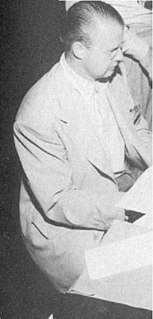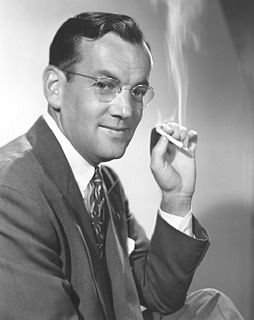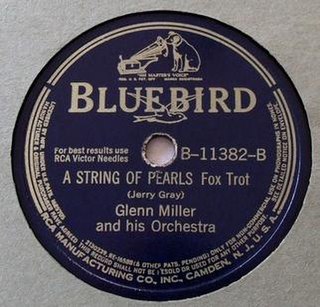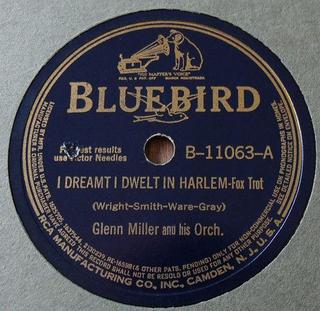
"In the Mood" is a popular big band-era jazz standard recorded by American bandleader Glenn Miller. "In the Mood" is based on the composition "Tar Paper Stomp" by Wingy Manone. The first recording under the name "In the Mood" was released by Edgar Hayes & His Orchestra in 1938.

Glenn Miller and His Orchestra was an American swing dance band formed by Glenn Miller in 1938. Arranged around a clarinet and tenor saxophone playing melody, and three other saxophones playing harmony, the band became the most popular and commercially successful dance orchestra of the swing era and one of the greatest singles charting acts of the 20th century.

Frankie Carle was an American pianist and bandleader. As a very popular bandleader in the 1940s and 1950s, Carle was nicknamed "The Wizard of the Keyboard". "Sunrise Serenade" was Carle's best-known composition, rising to No. 1 in the US in 1938 and selling more than one million copies.

Gordon Lee "Tex" Beneke was an American saxophonist, singer, and bandleader. His career is a history of associations with bandleader Glenn Miller and former musicians and singers who worked with Miller. His band is also associated with the careers of Eydie Gormé, Henry Mancini and Ronnie Deauville. Beneke also solos on the recording the Glenn Miller Orchestra made of their popular song "In The Mood" and sings on another popular Glenn Miller recording, "Chattanooga Choo Choo". Jazz critic Will Friedwald considers Beneke to be one of the major blues singers who sang with the big bands of the early 1940s.

John Chalmers MacGregor, better known as Chummy MacGregor, a musician and composer, was the pianist in The Glenn Miller Orchestra from 1936 to 1942. He composed the songs "Moon Dreams", "It Must Be Jelly ", "I Sustain the Wings", "Doin' the Jive", "Sold American", "Cutesie Pie" in 1932 with Bing Crosby and Red Standex, and "Slumber Song".

"Moonlight Serenade" is an American swing ballad composed by Glenn Miller with subsequent lyrics by Mitchell Parish. It was an immediate phenomenon when released in May 1939 as an instrumental arrangement, though it had been adopted and performed as Miller's signature tune as early as 1938, even before it had been given the name "Moonlight Serenade." In 1991, Miller's recording of "Moonlight Serenade" was inducted into the Grammy Hall of Fame.

Ernesto Caceres was an American jazz saxophonist born in Rockport, Texas. He was a member of the Glenn Miller Orchestra from 1940–1942.

Between 1938 and 1944, Glenn Miller and His Orchestra released 266 singles on the monaural ten-inch shellac 78 rpm format. Their studio output comprised a variety of musical styles inside of the Swing genre, including ballads, band chants, dance instrumentals, novelty tracks, songs adapted from motion pictures, and, as the Second World War approached, patriotic music.

Boom Shot is a 1942 song composed by Glenn Miller and Billy May for the 20th Century Fox movie Orchestra Wives starring George Montgomery and Ann Rutherford.

"A String of Pearls" is a 1941 song composed by Jerry Gray with lyrics by Eddie DeLange. It was notably recorded by Glenn Miller and His Orchestra on RCA Bluebird that November, becoming a #1 hit. The song is a big band and jazz standard.

Solo Hop is a 1935 instrumental composed by Glenn Miller and released as a Columbia 78 single. The recording was part of Glenn Miller's earliest sessions as a leader recording under his own name.

"I Dreamt I Dwelt in Harlem" is a 1941 jazz and pop song recorded by Glenn Miller and His Orchestra. The song was released as a 78 single on RCA Bluebird by Glenn Miller.

"Introduction to a Waltz" is a 1941 swing jazz instrumental by Glenn Miller. The instrumental was featured on two radio broadcasts of the Chesterfield program and was released as a 45 EP single.

"Pennsylvania 6-5000" is a 1940 swing jazz and pop standard with music by Jerry Gray and lyrics by Carl Sigman. It was recorded by Glenn Miller and His Orchestra as a Bluebird 78 rpm single.

"I Know Why " is a 1941 song by Glenn Miller and His Orchestra. The song appeared in the 20th Century Fox movie Sun Valley Serenade. The song was also released as an RCA Bluebird 78 single.

"Elmer's Tune" is a 1941 big band and jazz standard written by Elmer Albrecht, Dick Jurgens and Sammy Gallop. Glenn Miller and his Orchestra and Dick Jurgens and his Orchestra both charted with recordings of the composition.

Glenn Miller is a compilation album of phonograph records released posthumously by bandleader Glenn Miller and His Orchestra. Released in 1945 on RCA Victor as a part of the Victor Musical Smart Set series, described on the front cover as "An Album of Outstanding Arrangements on Victor Records", the set was number one for a total of 16 weeks on the newly created Billboard album charts. The album, also known under the title Glenn Miller and His Orchestra, was certified Gold in July 1968 by the RIAA.

The Glenn Miller Carnegie Hall Concert is a live album by Glenn Miller and his Orchestra. It documents a live concert recorded in Carnegie Hall in 1939. The album was released by RCA Victor in 1958.

Pure Gold is a 1975 compilation album of 10 studio recordings by Glenn Miller and his Orchestra recorded between 1939 and 1942 by RCA Victor. The recordings were all originally issued as 78 RPM records on the RCA Bluebird and Victor labels and was certified Gold by the RIAA. The album was originally issued on LP and compact disc in reprocessed (fake) stereo sound; in 1988, RCA remastered the album in original monophonic sound for its second CD reissue.



















